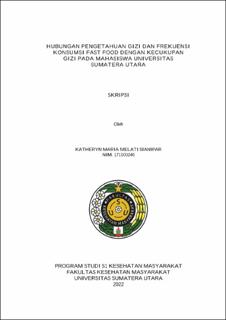Hubungan Pengetahuan Gizi dan Frekuensi Konsumsi Fast Food dengan Kecukupan Gizi pada Mahasiswa Universitas Sumatera Utara
The Relationship of Nutritional Knowledge and Frequency of Fast Food Consumption with Nutritional Adequacy of Universitas Sumatera Utara Students

Date
2024Author
Sianipar, Katheryn Maria Melati
Advisor(s)
Sudaryati, Etti
Metadata
Show full item recordAbstract
The younger generation who enter college, in addition to experiencing changes in learning, also experience changes in lifestyle, including the selection of the type of food consumed. Several factors influence consumption habits and the choice of types of food, namely knowledge of nutrition and the existence of fast food which is considered more practical. These factors affect the choice of food so that the nutritional adequacy of each individual will have an effect. This study aims to determine the relationship of nutritional knowledge and frequency of fast food consumption with nutritional adequacy of USU students. This type of research is quantitative with a cross sectional design. A sample of 100 respondents who are students of the health faculty at USU using a cluster random sampling technique via Google Form due to the COVID-19 pandemic. Based on the results of the study, there were students with good nutrition knowledge of 90.0%, frequent consumption of fast food was 85.0%, normal energy adequacy was 1.0%, normal protein adequacy was 7.0%, normal carbohydrate adequacy was 16.0 %, normal fat adequacy is 15%, adequate fiber adequacy is 22.0%, good vitamin A adequacy is 22.0%, good vitamin C adequacy is 10.0%, good Fe is 6.0%. Based on the test results, there is a relationship between nutritional knowledge and the adequacy of fiber and Fe and the frequency of fast food consumption with the adequacy of protein, vitamin C, and Fe (p<0.05), and there is no relationship between nutritional knowledge and the adequacy of energy, protein, carbohydrates, fat, vitamin A, and vitamin C and the frequency of consumption of fast food with sufficient energy, carbohydrates, fat, fiber, and vitamin A (p>0.05). It is recommended to USU institutions and students to intensify the importance of balanced nutrition and always pay attention to the nutritional balance of food consumption for the benefit of student performance in carrying out activities
Collections
- Undergraduate Theses [3186]
